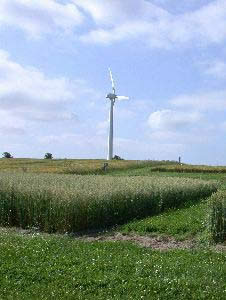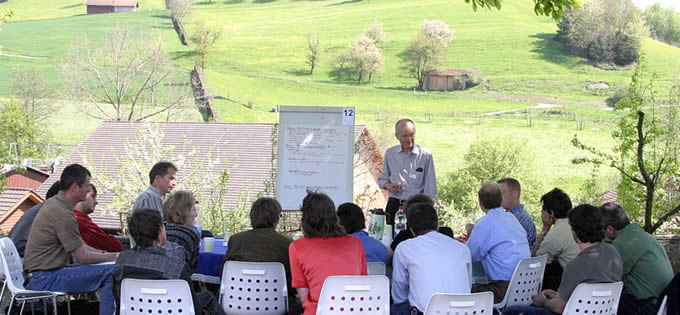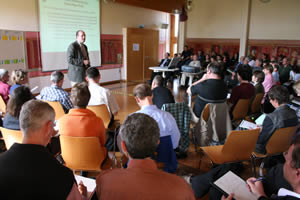|
| Denmark |
New research will focus on food quality, environment and conditions of third-world farmers
Increasing sale of organic products
|
| France |
Evaluation and new orientations of French research in organic food and farming |
| Norway |
Call for organic projects received 16 proposals
Norwegian Centre for Ecological Agriculture (NORSØK) – 20-year anniversary
4% organic milk by 2010 |
| Switzerland |
Open space technique to include stakeholder in research priority setting process |
Denmark
New research will focus on food quality, environment and conditions of third-world farmers
|
The Danish Research Centre for Organic Food and Farming (DARCOF) has recently launched its third consecutive research programme.
The new programme "International research cooperation and organic integrity" (DARCOF III is the inevitable acronym).
The programme consists of 15 projects. 6 of these will start in 2006; the remaining 9 will start in 2007. The programme will continue until 2010.
The six projects launched in 2006 focus at:
|
 |
Increasing sales of organic products
Sales of organic products are increasing in Denmark. In 2005, the sale of organic product reached a record or 2,3 billion Danish Kroner (300 million €). According to the Danish Statistical Office this is an increase of 12 percent compared to the year before.
The products most sold in Denmark are milk, cheese and eggs followed by fruit and vegetables. However, the largest increase in sales has been on meat products. Sales has increased from 2003 to 2005 with 67 percent.
Further information
Claus Bo Andreasen, Danish Research Centre for Organic Food and Farming (DARCOF)
Website: www.darcof.dk. E-mail: clausbo.andreasen@agrsci.dk
France
Knowledge interest and needs for the development of Organic Farming and Food (OF & F) in France: Evaluation and new orientations
Concerning the development of OF&F in France, the Ministry of Agriculture and Fisheries (MAP) expressed needs for knowledge and information in a recent coordination meeting in the frame of the convention with National Institute for Agricultural Research (INRA). Both parties validated the approach implemented by INRA during the previous five-year period and new orientations were discussed.
S. BELLON and B. SYLVANDER were mandated to proceed with the co-ordination of a research programme. The general concerns of the MAP relate to the evolution of the regulation, to the evaluation of public policies, to the link between organic farming and other forms of agriculture and to the development of OF&F at territorial level.
The MAP knowledge interest and needs can be classified in three categories.
- The first one refers to the support to OF&F as a production and transformation model, and its adaptations to regulation frameworks. Studies on selection of vegetal varieties or animal breeds adapted to OF conditions as well as studies on new specific crop health products (such as elicitors) are awaited.
- The second category, which can be affiliated with “prospective construction”, considering OF&F as a prototype of sustainable agriculture to be supported by relevant public policies. The needs concern for example analysis on environmental dimensions, employment and social requests at a local level.
- The last category is about the way to shift from a means-based approach to a mastering of results in OF&F. For example this would include biological monitoring of the territory and of the biodiversity or the definition of evaluation criteria for crop health products.
B. HUBERT (for INRA) and C. HUBERT (for the MAP) are respectively charged to elaborate a work plan by setting up a joint working group. This group will have to analyze and prioritise questions by specifying whether the question is of technical, lawful, or scientific nature. For scientific issues, the working group will also have to reflect if it is specific or not specific (i.e. generic question) of organic farming.
Further information
Annick Diolez, National Institute for Agricultural Research (FR)
Email: diolez_@_grignon.inra.fr
Norway
Call for organic projects received 16 proposals
16 proposals were submitted in April 2006 when the Research Council of Norway (RCN) in collaboration with the other public research funding bodies in the agricultural sector launched a common targeted call for Organic production and distribution. Six of the proposals were user-led innovation projects owned by industry or other companies, seven were knowledge-building projects with user involvement, and three were traditional research projects. The proposed research topics focus on the production, quality and distribution of organic fruit, berries and vegetables. Livestock research focuses on the control of weeds in perennial leys, appropriate housing for sheep, and protein-rich crops for concentrates. Proposals on innovative food products focus on bread, milk, oil and fermented sausages. Two proposals related to consumers suggested studies of direct sale schemes of organic food, and the impact of mothers’ nutrition on children’s health. One proposal focussed on the environmental effects of organic farming. Up to four projects from the call may receive funding.
4% organic milk by 2010
TINE, the largest Norwegian dairy company, has established its own organic goal, that 4% of the Norwegian milk consumption shall be organic within 2010. One of the means to achieve this was to convert a popular type of sour milk to organic. The consumers can now only get this product as organic. After some initial debate, this conversion has been a success and significantly contributed to increase the sale of organic milk. In the NORSØK-seminar (see below), several speakers emphasised the need for more organic farmers to receive a premium price if the 15%-goal shall be achieved. Due to the scattered Norwegian population and high costs of distribution, only farmers located in certain municipalities will receive a premium price from TINE by the end of 2006. It is a question of debate whether premium prices outside the selected municipalities should be paid by public money.
Further information
Anne-Kristin Løes, Bioforsk - Norwegian Institute of Agricultural and Environmental Research
Website: www.bioforsk.no. Email: anne-kristin.loes@bioforsk.no
|
 |
Norwegian Centre for Ecological Agriculture (NORSØK) – 20-year anniversary
On April 26, the former Norwegian research institute NORSØK celebrated its 20th birthday with a seminar about organic dairy farming (see below). A book was launched, describing the history and development from a grass-root initiative to a research institute with public funding. During the celebration, the Ministry of Agriculture and Food explained that the government aims at achieving their goal of 15% organic food consumption within 2015 by increased use of organic food in public canteens and meals for school pupils, as well as by increased funding for research and information. In the on-going economic negotiations between the Ministry and the farmers’ organisations, the government has offered more funding for research and development purposes than the organisations asked for.
Website: www.bioforsk.no. Email: anne-kristin.loes@bioforsk.no
Switzerland
Open space technique to include stakeholder in research priority setting process

The Swiss state research centres – Agroscope – and the Research Institute of Organic Agriculture (FiBL) are currently setting their priorities for their work programme 2008 to 2011, to be finalized in 2007. An open space workshop was organized, in order to give different stakeholder groups the possibility to give an active input to the priority setting process.
About hundred participants including researchers from Agroscope and FiBL, consultants and organic farmers and representatives of Bio Suisse identified future research topics. The open space event offered a excellent platform for a dialogue between research providers and the organic sector. The event was organized by the organic farming research coordination group of Agroscope- FiBL and hosted by FiBL.
| It was for the first time that the priority setting process was carried out in this a early stage of the work programme planning process.
The workshop was opened by Professor Carlo Leifert of the University of Newcastle and coordinator of the Quality Low Input Food project.
Carlo Leifert looked at Swiss organic farming research from an international perspective. Leifert said that Switzerland was one of the leading countries in organic farming research in Europe.
According to criteria developed by the University of Newcastle the private FiBL has most points regarding research & development and technology transfer compared to the other specialized organic farming institution in Europe.
Agroscope is place three in Europe among the conventional research institutions who are also dealing with organic farming research.
|

Professor Carlo Leifert, University of Newcastle (UK) presents his paper on the future role of organic research in Switzerland in a European context.
Photos: Thomas Alföldi, FiBL, CH-Frick
|
In a plenary with all participants 25 topics were identified, which were then discussed in workshops. Participants gave high importance to different aspects of food quality, improvement of production techniques for low input arable crops, soil fertility research, efficient use of non renewable energy. Improving communication between researchers, farmers and consumers was considered as an important topic, too. A characteristic of the open space method is that participants can move between the workshops. The overall feedback on the day was positive, in particular that the farmers actively participated.
Further information
Thomas Alföldi, Research Institute of Organic Agriculture (FIBL),
Tel. +41 62 8657272, Internet www.fibl.org
Dr. Padruot M. Fried, Federal Research Station Agrocecology and Farming
Tel: +41 1 377-7222 Fax: +41 1 3777201. www.reckenholz.ch/doc/de/forsch/landbau/bio/bio.html
|

